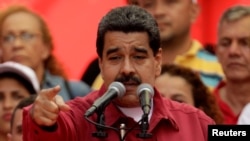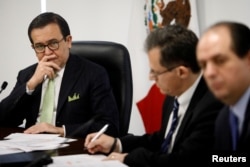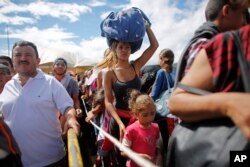U.S. President Donald Trump has invited three Latin American leaders to dine with him next week in New York as he seeks to address the Venezuela crisis and build bridges with the region after an acrimonious start with neighbor Mexico.
The political and economic turmoil in Venezuela, source of 10 percent of the oil consumed by the United States, will almost certainly top the agenda when he receives the center-right presidents of Peru, Colombia and Brazil at Trump Tower on Monday evening, diplomats said.
"Trump needs to show that he has good friends in the region who share a positive agenda with the United States, but I am not sure he will get what he wants," said a Brazilian diplomat, who asked not to be named to be able to speak freely on the matter.
White House officials confirmed Trump will dine with several Latin American leaders on Monday night, with Venezuela expected to be the main topic of conversation. Cuba will also be discussed, one of the officials said.
The dinner will take place on the eve of the opening of the U.N. General Assembly in New York. Mexico's President Enrique Pena Nieto, who will leave office after elections next year, has decided not to attend.
Mexico riled
Trump has annoyed Mexico, his country's main trading partner in Latin America, by accusing it of stealing U.S. jobs, threatening to pull out of the North American Free Trade Agreement and insisting it pay for a border wall he plans to build to keep out illegal immigrants.
Trump has no major initiatives under way with other Latin American countries. In fact, two of the countries to be represented Monday — Colombia and Peru — are members of the Trans-Pacific Partnership, which the United States withdrew from shortly after he took office.
On Wednesday, Trump upset Colombia, the South American nation with the closest ties to Washington, by threatening to blacklist it for failing to stop a surge in cocaine production, most of which ends up sold on the streets of U.S. cities.
The two countries have long been close allies in the fight against illegal narcotics but in recent years broadened the focus of their relationship to include trade and Colombia's peace process with leftist guerrillas.
Colombian President Juan Manuel Santos' government rejected the criticism of his country's anti-drug record on Thursday.
Shared concern over how to deal with Venezuela, where at least 125 people were killed in four months of demonstrations against the Socialist government, will dominate Monday's dinner, according to Latin America expert Michael Shifter.
"Trump and his team are very worried about Venezuela and they want to consult with Venezuela's neighbors Colombia and Brazil, and Peru's President Pedro Pablo Kuczynski, who has taken a leading role on the Venezuelan issue in the region," said Shifter, president of the Inter-American Dialogue, a Washington-based policy group.
Venezuelans flee
Thousands of Venezuelans have spilled over the border into Colombia and Brazil, fleeing the once-prosperous oil-producing nation that opponents of President Nicholas Maduro say has become a dictatorship.
While the Latin American leaders due to meet with Trump have stepped up pressure on Maduro to free political prisoners and hold general elections, they are unlikely to agree to the tougher unilateral economic sanctions that the U.S. president favors.
"Colombia and Brazil prefer a negotiated solution to the crisis and not economic sanctions that will hurt the Venezuelan people more than the government," the Brazilian diplomat said.
Meetings due this week in the Dominican Republic between the Venezuelan government and the opposition could be a start in solving the crisis, as long as Maduro is not just out to win time, the diplomat said.
The opposition, however, says it has so far agreed only to send a delegation to discuss with Dominican President Danilo Medina the conditions under which talks could begin.
Peru has not objected to the financial sanctions imposed by the Trump administration on the Maduro government, Shifter said.
"But if the U.S. ratchets up sanctions, like cutting off oil imports, and takes a more interventionist position on Venezuela, that could distance the United States from its Latin American neighbors," he said.







